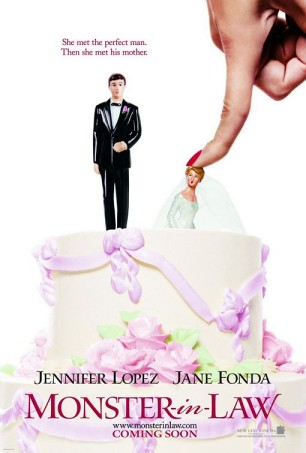|
Monster-in-Law
It
would be one thing to dismiss this film as merely another
notch in Jennifer Lopez’s schmaltzy romantic comedy
laden belt. That would be all too easy. Sometimes it’s
easier to discredit a film for its genre limitations than
it is too look beyond the misfires and see wasted opportunity.
The
true monstrosity here is not, in fact, any of the characters
involved in this moderately amusing retread of the Meet
the Parents formula, but instead the absence of any
semblance of weight to back up Jane Fonda’s return
to the silver screen after a fifteen year hiatus.
Early
buzz suggested that Fonda had picked the perfect vehicle
to announce her return to the silver screen. She had passed
up a juicy role in Cameron Crowe’s upcoming Elizabethtown
to star in…this? Nevermind that Jennifer Lopez was
involved in the project, because she has proven both hot
and cold at times. Of all the offers that must have been
stacking up on Fonda’s agent’s desk over the
course of the last fifteen years, she opts to sink her teeth
into something like Monster-in-Law?
Wasn’t
this to be Fonda’s Something’s Gotta Give?
Granted,
the bauble does not merely begin with Fonda’s poor
decision to sign onto the project, the mere premise of the
film is troubled from the beginning. It’s not even
to say that she has lost her command, Fonda delivers when
necessary and when given something to work with, the problem
is that these moments are few and far between the rest of
the absurdity transpiring around her character Viola.
You
know the drill. Beautiful Charlie (Lopez) is lovelorn and
lost in a world of opportunity. Rather than following her
dreams of becoming an artist (or was it working in fashion
design?) she has consigned herself to various temp jobs
ranging from dog walker, front desk worker, caterer, and
a slew of other throw away odd jobs. She meets Dr. Kevin
Fields (Michael Vartan) first on a beach, then in a coffee
shop, and then finally at a party she is catering.
After
a saccharine cute courting confusion, the good doctor and
Charlie end up connecting, and anyone can tell where this
is heading. Cue Fonda’s Viola, a dedicated talk show
host superstar who is anticipating a promotion when network
executives arrive at her dressing room prior to the taping
of her show. Instead she is handed a pink slip, told that
she is being replaced by a buxom young counterpart, and
manages to tarnish her sterling reputation by strangling
a Britney Spears-like pop star on her live television show.
 |
Here
is where the trouble really begins rearing its ugly head.
Cuts happen so quickly that when post-strangling Viola meets
with a shrink, we are shocked to find out that this meeting
is actually the last of her three month recovery in a mental
health facility. Her breakdown supposedly overcome, Viola
returns home eagerly wishing to re-establish her relationship
with her son, you guessed it, Kevin. Instead of being allowed
to remain the one and only woman in her dear son’s
life, Viola must now contend with a young counterpart reminiscent
of her talk-show replacement.
Potential,
no? Just wait.
Charlie’s
scattered nature stems from a severed relationship with
family, cut short by death. Despite her loss, Charlie remains
hopelessly optimistic and dreadfully “cute”
while she hops from one job to another. Despite her lack
of commitment, she somehow manages to afford a beautiful
beachfront apartment, but never mind that. The theme of
family is set up in such a way that viewers accustomed to
the “formula” in films such as this will recognize
it immediately, and then question its absence until conveniently
re-emerging in the third act to save the day. Convenience?
Meet contrived.
A well
developed screenplay could have played with Charlie’s
lack of commitment and found resonance in contrast to Viola’s
(Fonda) dedication to her career and her resulting mental
breakdown when said career is stripped out from underneath
her. All the potential in the setup is completely lost once
the “battle” begins. A well developed screenplay,
this is not.
Yes,
Monster-in-Law has the prerequisite pieces to make
an interesting film. Unfortunately these facets are trampled
beneath the need to shuck and jive audiences with safe familiarity.
The
only character to come close the sort of grounded edginess
required to pull us further into the film is Viola’s
assistant Ruby, played by Wanda Sykes. Sykes is the sort
of comedian that could keep me entertained merely walking
the streets with a camera and riffing on whatever might
come her way. She is subdued here, but one can’t help
but wish that Viola and Charlie had somehow found a way
to live in Ruby’s world instead of the forced miasma
that they seem so content inhabiting.
Does
Charlie ever find the confidence to pursue her artistic
dreams? Does her love interest, Dr. Kevin Fields (Michael
Vartan) ever contribute anything other than his presence
to the conflict at hand? Is Viola actually mentally unstable
or is she merely playing it up? These questions, as clichéd
as their resolutions may have been if played out, are pre-requisite
for films such as these. Without them, it feels hollow.
And
yet the film is undeniably “Ok.” Sure, you wish
it had done certain things differently here and there, but
then ultimately end up asking, “Why do I even care?”
Monster-in-Law fails to connect on the necessary
level to establish audience investment with any of its characters
that by the end of the film you don’t feel robbed
so much because it did, after all, have some laughs. Yet
it can’t be denied that something was missing in the
puzzle, somewhere.
My wife,
whom is usually far more forgiving of films of this ilk,
had this to say, “It didn’t make me cry, so
it must not have been that great.”
Touché.
Rating:

|







